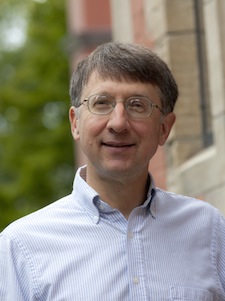Bowdoin’s Naculich Discusses the Nature of Time on Maine Public Radio
By Tom PorterHow do you explain the concept of time? Is it constant? How do you measure it? Physics scholar Stephen Naculich is invited to share his thoughts on air as Maine Public Radio’s call-in show, Maine Calling, tackles this big subject.

Time is often characterized as the fourth dimension, “in addition to the three spatial dimensions that we live in,” said Naculich, Bowdoin’s LaCasce Family Professor of Natural Sciences. This means if we want to accurately describe an event, he added, “we must specify not only where it happens but when it happens.”
Furthermore, he added, it’s important to appreciate how the scientific understanding of time was profoundly affected by the work of legendary physicist Albert Einstein. His theory of special and general relativity posits that “space and time are closely related to one another...in such a way that we can't really talk about them separately. We need to talk about a single entity called space-time.”
It’s a complex subject, said Naculich, but “the upshot is that time is not quite as simple as everyone thinks.” Scientists used to think that time existed independently of everything else and was the same for everyone, but this not true, he explained. “Albert Einstein showed...that time is perceived differently by different observers, in particular observers who are moving with respect to one another. In fact,” he added, “time moves more slowly for a moving observer as perceived by stationary observer. This is very strange. It's called time dilation.”
For example, “if you were in a rocket ship that was moving at 90 percent of the speed of light, the time would flow at half the rate of a stationary observer,” and as a result, said Naculich, you would age at half the rate, “so it's actually a question of time slowing down at high speeds.”
Things get “even weirder” when we study Einstein’s general theory of relativity, he explained, which shows how the effect of gravity causes “four-dimensional space-time [to become] curved, especially in the presence of large masses.” This means that “time flows at different rates in different locations. In particular,” he added, it means “time will slow down as you get nearer a massive object such as the sun or...a black hole. Even the earth's gravitational field will cause time to flow slightly more slowly.” This, he said, means that clocks on earth will get out of sync with clocks in satellites orbiting high above the earth.
Naculich was joined on Maine Calling by fellow guest Lauren Ashwell of Bates College, a professor of philosophy who specializes in metaphysics. Listen to the show.



